#media literacy
Text
headcanon: "i have decided that this is true about the character, and it doesn't matter to me if the canon text supports my idea or not."
interpretation: "after considering elements present in the canon text, I have decided that this might be true about the character and here's why."
subtext: "I can show you strong evidence in the text and context of the work that this interpretation could be the actual authorial intent."
151 notes
·
View notes
Text
Pros of reading authors you don't agree with:
You can make informed rants about how wrong they are.
A+ practice for learning to read texts critically and thinking for yourself, even among people you do agree with.
Occasionally, begrudgingly, they may have a point.
Even if they don't, being able to articulate why helps you understand your own beliefs and spot errors in your thinking.
You'll be much more persuasive to the other side if you understand their arguments and aren't just making assumptions based on what you've heard from others.
Academic drama is incredible.
84 notes
·
View notes
Text
I genuinely think a lot of outrage over whether/how things are being covered by the news would be solved by Tumblr users actually regularly engaging with major news sources.
I recently saw a post with someone expressing outrage about how the Washington Post "broke" the news about Biden signing the aid package to Israel and that they had to search so much to find the information, as though there hasn't been literally months of coverage from every major news site that covers politics about the machinations to get Israel and Ukraine funding through Congress.
I see people saying that nobody covers what Israel is doing in Gaza--as though that hasn't been a major topic in the news for months. I see people talking about how nobody covers what's happening in Yemen, Sudan, Haiti, etc. as though, again, that requires more than literally googling things like "Yemen New York Times" to find a wide breadth of coverage that spans years.
Critiques of news coverage are absolutely fair and valid--but when you start them by saying that "nobody is talking about this" all it shows is that you aren't bothering to look.
#news literacy#media literacy#to be clear the nyt wapo etc are not in any way perfect in their coverage#but if you don't know basic information about what's going on in american politics like them passing these funding bills#that's a skill issue#not a nyt issue#let's have useful critiques of things
55 notes
·
View notes
Text
I need Doofenshmirtz to make a media literacy-anator because what is going on
#media literacy is on the decline#media literacy#media analysis#writing#writing community#anti sarah j maas#anti sjm#sjm critical#anti coho#anti booktok
25 notes
·
View notes
Text
What's that bro? You began interacting with a media from a different country than yours and/or was made in time period different than the recent present day? Haha that's sick bro! Keep expanding your horizons bro! You're remembering to take into account that sociocultural norms, gender roles and genre expectations are different from what you are used to and meeting the story halfway, instead of forcibly superimposing your ideals into the story, right bro? Right? Right?
46K notes
·
View notes
Text


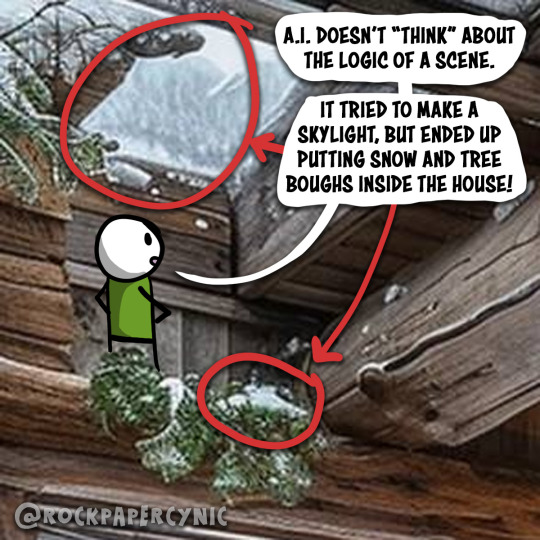
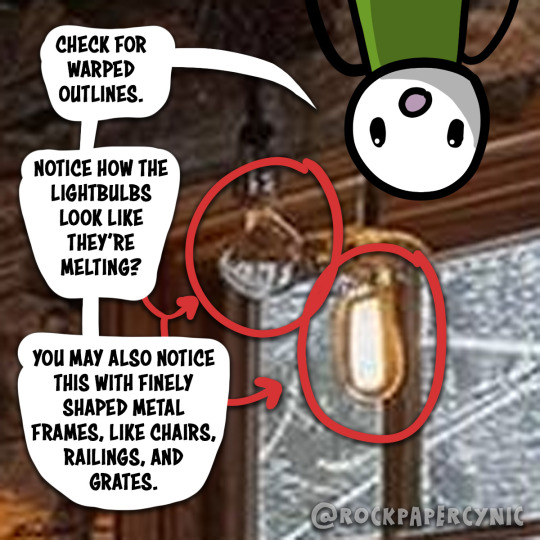
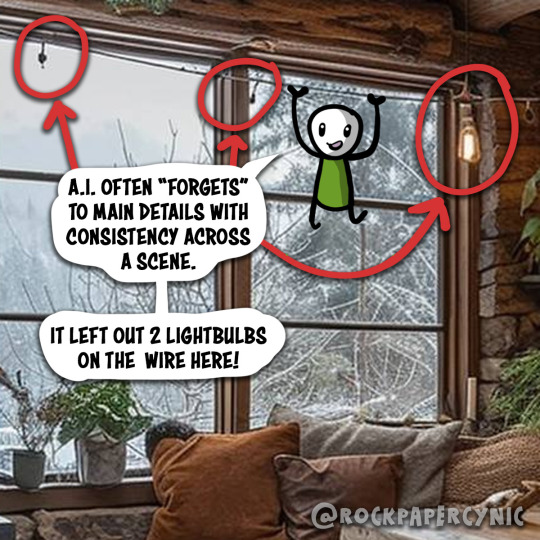
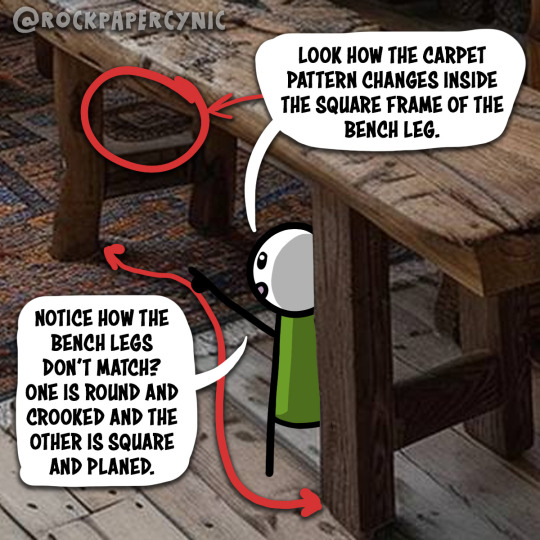

A.I. photos are flooding social media and contributing to an Internet where we can't believe what we see. Spotting A.I. 📷s is an important media literacy skill.
None of us have time to research every image we see. We just need people to notice BEFORE THEY LIKE OR SHARE that an image might be fake. If unsure, check it or don't share.
I've started drawing some comics explaining the basic of AI spot-checking and media literacy in the age of disinformation. Follow along here or on my Twitter.
29K notes
·
View notes
Text
"Fiction is not a 1:1 reflection of reality" and "the U.S. military doesn't support and finance American action movies and video games for fun" are concepts that can and should coexist
16K notes
·
View notes
Text
Bryan Lee O'Malley remarking that he had Scott explicitly spell out that his relationship with Knives was inappropriate in Scott Pilgrim Takes Off because he feels like a lot of the comic's readers maybe didn't pick up on that is very funny not only because how do you not, but also because the original Scott Pilgrim comics are some of the most didactic media I've ever read outside of, like, medieval Christian allegories about the wages of sin. It's just constantly explaining to the reader exactly why Scott is a bad person, sometimes with little annotated diagrams. Genuinely, what's it gonna take for the twentysomething male audience not to idolise a loser?
#media#comics#bryan lee o'malley#scott pilgrim takes off#scott pilgrim#reading comprehension#media literacy#religion mention#christianity mention#scott pilgrim takes off spoilers#scott pilgrim spoilers#spoilers#m
20K notes
·
View notes
Text
"I miss when movies weren't political-"
ALIEN is about a megacorporation coercing some salvagers into transporting a dangerous creature without telling them what it is, all because the creature could be a great bioweapon for them. When a survivor of this failed transport mission wants reparations, they screw her over to avoid a scandal.
ROBOCOP is about another mega-corporation experimenting with a cop's body and declaring him their property, trying to reduce him to an obedient killing machine who can maintain the status quo for them.
JURASSIC PARK is about a rich billionaire going all out to make a dinosaur-themed amusement park, not caring about the real-world implications of resurrecting giant lizards. He also underpays ONE guy to maintain the entire park's security systems so predictably, that one guy betrays him at a crucial moment.
The best movies weave their politics with plot & character, so you can enjoy them as entertainment but can also notice the themes. Movies without themes wind up being all spectacle and no substance, just noise and color like Michael Bay's Transformers franchise. Yeah, they make money, but they'll be forgotten in 2 generations.
#transformers#anti capitalism#barbie movie#barbie the movie#robocop#alien#aliens#alien 1979#jurassic park#dinosaurs#socialism#capitalism#politics#wokeness#antiwoke#horror#feminism#themes#media literacy#mad max#mad max fury road#ceo#megacorporation#megacorporations#underwater 2019#eat the rich#the hunger games#stockton rush#andrew ryan#i am legend
2K notes
·
View notes
Text
i think in general sometimes when people interpret characters they give them too much credit in a sense that they forget that people are often very much contradictory in their beliefs and sometimes they believe one thing but do another like. sometimes people say they want to leave when they want to stay. sometimes they stay when they want to leave. sometimes they say they understand something when they don’t and sometimes they say they don’t need things that they’re desperately yearning for. and if you want to create an appropriately multi dimensional reading of a character you need to accommodate this.
#media literacy#but also#media deconstruction#also i gave examples for wanting one thing doing another#but dont miss me saying that they can be contradictory even just in belief#or in needs or in wants etc#i don't even remember what it was about i found it in my drafts?? curious who annoyed me to make this post happen
10K notes
·
View notes
Text
For a friend who wanted links to some posts I made about antisemitism, allyship, and how to support Palestine without being antisemitic—which is both possible and easy to do!
How do you know if you’re antisemitic?
How to be a good ally for Jewish people. I responded to a wonderful ask from @faggotry-enjoyer about how to be a better ally and to discuss Israel/Palestine with people who are inclined to distrust Jews due to unexamined antisemitism.
Important post about the dangers faced by Jews as an extreme minority. There are good examples in the reblogs and replies and tags—both of great ways for non-Jews to provide support as well as if antisemites denying their own antisemitism. Therese even one example of ways Jews can and do disagree with each other while remaining respectful without delving into antisemitism OR Islamophobia OR denying the rights and dignity of Palestinians. Jews can do this and so can non-Jews. But that can’t happen if people hate us too much to listen to anything we have to say.
The emotional toll of antisemitism on Jewish people.
Example of the death threats we get that are designed to make us look like bad guys.
If Jews can learn about the Holocaust in detail before we even reach the age of ten, you can and should too.
Don’t trust people who rely on bad sources. People do make genuine mistakes. Here’s an example of bad faith link sharing. Especially when Reblogging things. Even I don’t have time to always check every source in a post. Also, it’s possible that a link seemed legitimate when it was originally posted but the source is either no longer trustworthy or the OP got better at assessing sources. If an error in their original sourcing is pointed out, they should correct it publicly. If they are sharing a link as an OP they should always take time to be as responsible as possible.
There are plenty more posts under my #leftist antisemitism tag to look into about a variety of ways that antisemitism manifests in left wing circles.
Allies, please reblog with any posts you think relevant for a someone new to dismantling their antisemitism.
#antisemitism#leftist antisemitism#media literacy#master post#resources#Jewish goyim solidarity#israel#frequently referenced#start here#jewish palestinian solidarity
2K notes
·
View notes
Text
Things I look for in history books:
🟩 Green flags - probably solid 🟩
Has the book been published recently? Old books can still be useful, but it's good to have more current scholarship when you can.
The author is either a historian (usually a professor somewhere), or in a closely related field. Or if not, they clearly state that they are not a historian, and encourage you to check out more scholarly sources as well.
The author cites their sources often. Not just in the bibliography, I mean footnotes/endnotes at least a few times per page, so you can tell where specific ideas came from. (Introductions and conclusions don't need so many citations.)
They include both ancient and recent sources.
They talk about archaeology, coins and other physical items, not just book sources.
They talk about the gaps in our knowledge, and where historians disagree.
They talk about how historians' views have evolved over time. Including biases like sexism, Eurocentrism, biased source materials, and how each generation's current events influenced their views of history.
The author clearly distinguishes between what's in the historical record, versus what the author thinks or speculates. You should be able to tell what's evidence, and what's just their opinion.
(I personally like authors who are opinionated, and self-aware enough to acknowledge when they're being biased, more than those who try to be perfectly objective. The book is usually more fun that way. But that's just my personal taste.)
Extra special green flag if the author talks about scholars who disagree with their perspective and shows the reader where they can read those other viewpoints.
There's a "further reading" section where they recommend books and articles to learn more.
🟨 Yellow flags - be cautious, and check the book against more reliable ones 🟨
No citations or references, or references only listed at the end of a chapter or book.
The author is not a historian, classicist or in a related field, and does not make this clear in the text.
When you look up the book, you don't find any other historians recommending or citing it, and it's not because the book is very new.
Ancient sources like Suetonius are taken at face value, without considering those sources' bias or historical context.
You spot errors the author or editor really should've caught.
🟥 Red flags - beware of propaganda or bullshit 🟥
The author has a politically charged career (e.g. controversial radio host, politician or activist) and historical figures in the book seem to fit the same political paradigm the author uses for current events.
Most historians think the book is crap.
Historical figures portrayed as entirely heroic or villainous.
Historical peoples are portrayed as generally stupid, dirty, or uncaring.
The author romanticizes history or argues there has been a "cultural decline" since then. Author may seem weirdly angry or bitter about modern culture considering that this is supposed to be a history book.
The author treats "moral decline" or "degeneracy" as actual cultural forces that shape history. These and the previous point are often reactionary dogwhistles.
The author attributes complex problems to a single bad group of people. This, too, is often a cover for conspiracy theories, xenophobia, antisemitism, or other reactionary thinking. It can happen with both left-wing and right-wing authors. Real history is the product of many interacting forces, even random chance.
The author attempts to justify awful things like genocide, imperialism, slavery, or rape. Explaining why they happened is fine, but trying to present them as good or "not that bad" is a problem.
Stereotypes for an entire nation or culture's personality and values. While some generalizations may be unavoidable when you have limited space to explain something, groups of people should not be treated as monoliths.
The author seems to project modern politics onto much earlier eras. Sometimes, mentioning a few similarities can help illustrate a point, but the author should also point out the limits of those parallels. Assigning historical figures to modern political ideologies is usually misleading, and at worst, it can be outright propaganda.
Extraordinary claims require extraordinary evidence. "Big theory" books like Guns, Germs and Steel often resort to cherry-picking and making errors because it's incredibly hard for one author to understand all the relevant evidence. Others, like 1421, may attempt to overturn the historical consensus but end up misusing some very sparse or ambiguous data. Look up historians' reviews to see if there's anything in books like this, or if they've been discredited.
There are severe factual errors like Roman emperors being placed out of order, Cleopatra building the pyramids, or an army winning a battle it actually lost.
When in doubt, my favorite trick is to try to read two books on the same subject, by two authors with different views. By comparing where they agree and disagree, you can more easily overcome their biases, and get a fuller picture.
(Disclaimer - I'm not a historian or literary analyst; these are just my personal rules of thumb. But I figured they might be handy for others trying to evaluate books. Feel free to add points you think I missed or got wrong.)
933 notes
·
View notes
Text
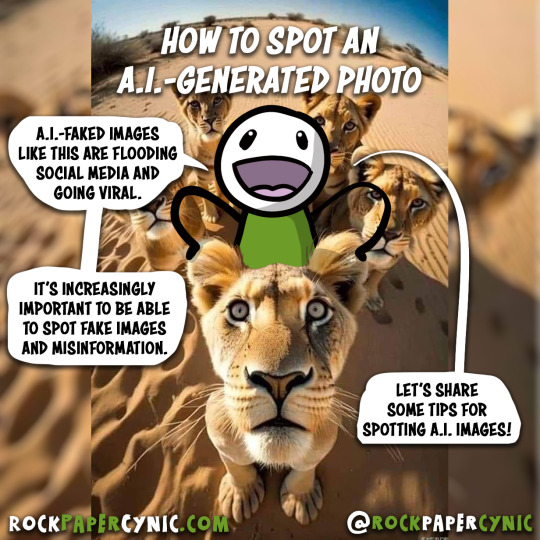
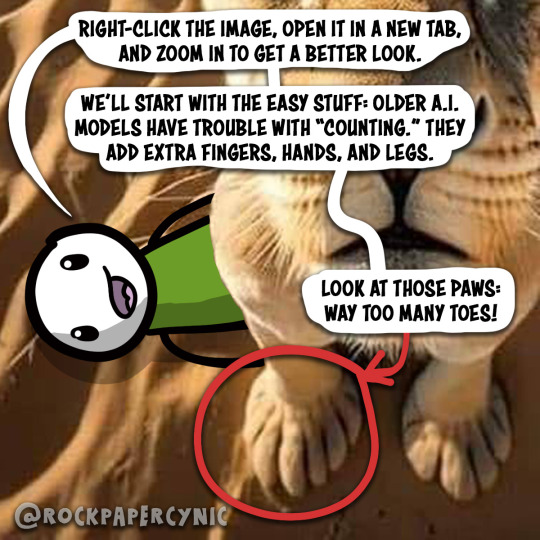


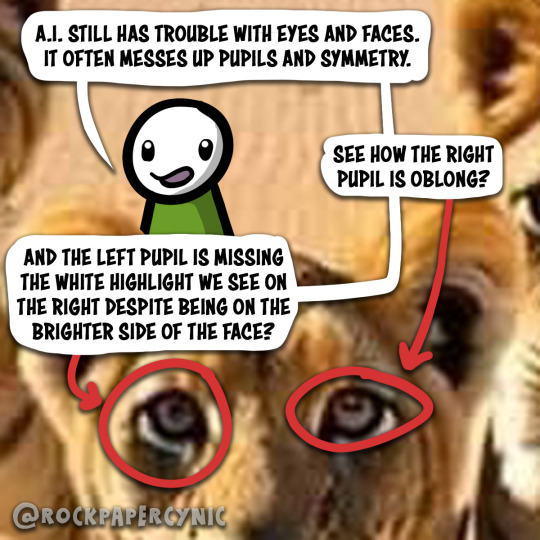
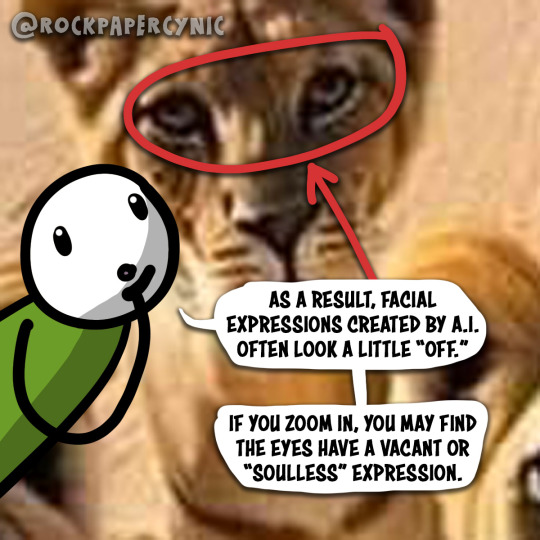
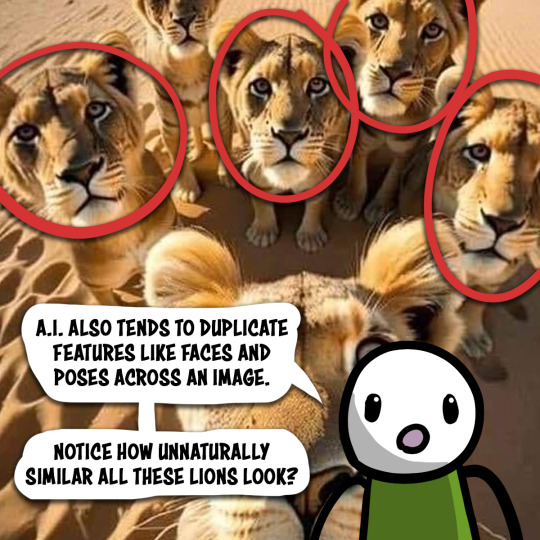
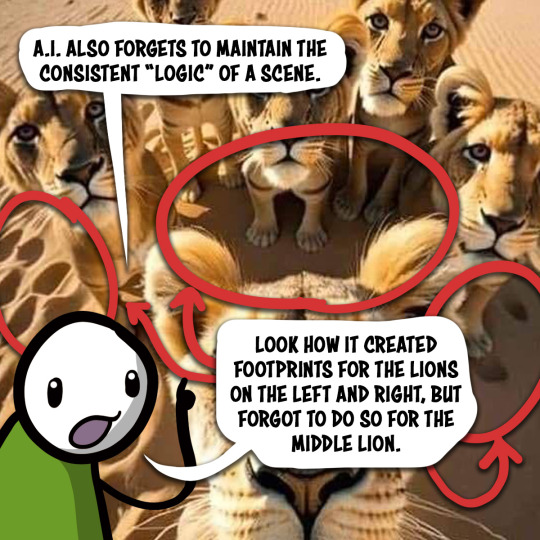
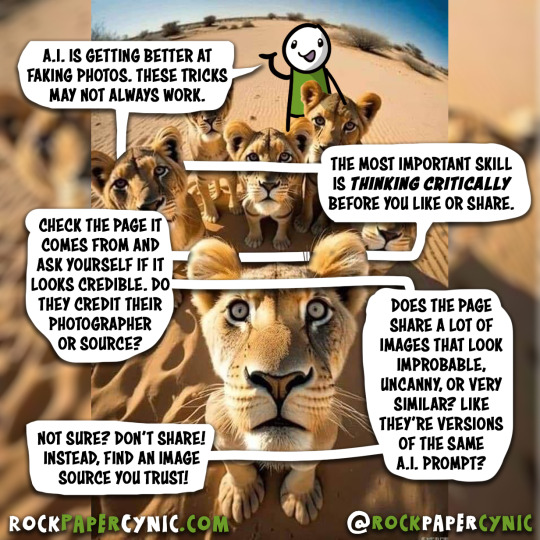
The internet is flooded with AI-generated photos and they're getting harder to spot.
Most of the time AI is used for click-farming, but lately images have been used in fake news stories and product scams.
Most important: THINK CRITICALLY. AI will eventually get too good to make obvious mistakes. Being media literate means checking not just if an image is real, but if the source is trustworthy.
If you're not sure, don't share! You might be spreading misinformation.
18K notes
·
View notes
Text
A media literacy handbook for Israel-Gaza

Next Tuesday (Oct 31) at 10hPT, the Internet Archive is livestreaming my presentation on my recent book, The Internet Con.

Media explainers are a cheap way to become an instant expert on everything from billionaire submarine excursions to hellaciously complex geopolitical conflicts, but On The Media's "Breaking News Consumers' Handbooks" are explainers that help you understand other explainers:
https://www.wnycstudios.org/podcasts/otm/segments/breaking-news-consumers-handbook-israel-and-gaza-edition-on-the-media
The latest handbook is an Israel-Gaza edition. It doesn't aim to parse fine distinctions over the definition of "occupation" or identify the source of shell fragments. Rather, it offers seven bullet points' worth of advice on weighing all the other news you hear about the war:
https://media.wnyc.org/media/resources/2023/Oct/27/BNCH_ISRAEL_GAZA_EDITION_1.pdf
I. "Headlines are obscured by the fog of war"
Headline writers have a hard job under the best of circumstances – trying to snag your interest in a few words. Headlines can't encompass all the nuance of a story, and they are often written by editors, not the writers who produced the story. Between the imperatives for speed and brevity and the broken telephone between editors and writers, it's easy for headlines to go wrong, even when no one is attempting to mislead you. Even reliable outlets will screw up headlines sometimes – and that likelihood goes way up in times like these. You gotta read the story, not just the headline.
II. Know red flags for bullshit
The factually untrue information that spreads furthest tends to originate with a handful of superspreader accounts. Whether these people are Just Wrong or malicious disinfo peddlers, they share a few characteristics that should trip your BS meter and prompt extra scrutiny:
High-frequency posting
Emotionally charged framing
Posts that purport to be summaries or excerpts from news outlets, but do not include links to the original
The phrase "breaking news" (no one has that many scoops)
III. Don't trust screenshots
Screenshots of news stories, tweets, and other social media should come with links to the original. It's just too damned easy to fake a screenshot.
IV. "Know your platform"
It used to be that Twitter got a lot of first-person accounts from people in the thick of crises, while Facebook and Reddit contained commentary and reposts. Today, Twitter is just another aggregator. This time around, there's lots of first-person, real-time reporting coming off Telegram (it runs well on old phones and doesn't chew up batteries). Instagram is widely used in both Israel and the West Bank.
V. "Crisis actors" aren't a thing
People who attribute war images to "crisis actors" are either deluded or lying. There's plenty of ways to distort war news, but paying people to pretend to be grieving family members is essentially unheard of. Any explanation that involves crisis actors is a solid reason to permanently block that source.
VI. There's plenty of ways to verify stuff that smells fishy
TinEye, Yandex and Google Image Search are all good tools for checking "breaking" images and seeing if they're old copypasta ganked from earlier conflicts (or, you know, video-games). The fact that an image doesn't show up in one of these searches doesn't guarantee its authenticity, of course.
VII. Think before you post
Israel-Gaza is the most polluted media pool yet. Don't make it worse.
There's plenty more detail on this (especially on the use of verification tools) in Brooke Gladstone's radio segment:
https://www.wnycstudios.org/podcasts/otm/episodes/on-the-media-breaking-news-consumers-handbook-israel-gaza-edition
The media environment sucks, and warrants skepticism and caution. But we also need to be skeptical of skepticism itself! As danah boyd started saying all the way back in 2018, weaponized media literacy leads to conspiratorialism:
https://www.zephoria.org/thoughts/archives/2018/03/09/you-think-you-want-media-literacy-do-you.html
Remember, the biggest peddlers of "fake news" are also the most prolific users of the term. For a lot of these information warriors, the point isn't to get you to believe them – they'll settle for you believing nothing. "Flood the zone with bullshit" is Steve Bannon's go-to tactic, and it's one that his acolytes have picked up and multiplied.
It's important to be a critical thinker, but there's plenty of people who've figured out how to weaponize a critical viewpoint and turn it into nihilism. Remember, the guy who wrote How To Lie With Statistics was a tobacco industry shill who made his living obfuscating the link between smoking and cancer. It's absolutely possible to lie with statistics, but it's also possible to use statistics to know the truth, as Tim Harford explains in his 2021 must-read book The Data Detective:
https://pluralistic.net/2021/01/04/how-to-truth/#harford
There's a world of difference between being misled and being brainwashed. A lot of today's worry about "disinformation" and "misinformation" has the whiff of a moral panic:
https://www.nakedcapitalism.com/2023/10/are-we-having-a-moral-panic-over-misinformation.html
It's possible to have a nuanced view of this subject – to take steps to enure you're not being tricked without equating crude tricks like sticking a fake BBC chyron on a 10-year-old image with unstoppable mind-control:
https://sts-news.medium.com/youre-doing-it-wrong-notes-on-criticism-and-technology-hype-18b08b4307e5

If you'd like an essay-formatted version of this post to read or share, here's a link to it on pluralistic.net, my surveillance-free, ad-free, tracker-free blog:
https://pluralistic.net/2023/10/28/fog-o-war/#breaking-news
#pluralistic#media literacy#fake news#disinformation#misinformation#israel gaza#gaza#israel#palestine#conspiratorialism#hoaxes#infowar#on the media#breaking news#npr#flood the zone
2K notes
·
View notes
Text
From the article:
Should we worry, as massive book-banning efforts imply, that young people will be harmed by certain kinds of books? For over a decade and through hundreds of interviews, my colleague, literacy professor Peter Johnston, and I have studied how adolescents experience reading when they have unfettered access to young adult literature. Our findings suggest that many are helped rather than harmed by such reading.
For one study, we spent a year in a public middle school in a small, mid-Atlantic town, observing and talking to eighth grade students whose teachers, rather than assigning the “classics” or traditional academic texts, let students choose what to read and gave them time to read daily in class. To support student engagement, they made available hundreds of contemporary books that are relevant to the students’ lives. The books included many of the titles currently being challenged, according to PEN America, which is a nonprofit that advocates against censorship, among other things. The titles include Ellen Hopkins’ “Identical,” Jay Asher’s “Thirteen Reasons Why,” Patricia McCormick’s “Sold,” and others that were banned because of themes of sex and violence.
We were interested in what the students perceived to be the consequences of reading young adult literature. They tended to read books they described as “disturbing.” At the end of the school year, we interviewed 71 of the students about changes in their reading and relationships with peers and family.
We also asked open-ended questions about how, if at all, they had changed as people since the beginning of the year. Beyond reading substantially more than they had previously, they reported positive changes in their social, emotional and intellectual lives that they attributed to reading, the kinds of books they read and the conversations those books provoked.
Here are six ways students told us they had been changed by reading and talking about edgy young adult books.
670 notes
·
View notes